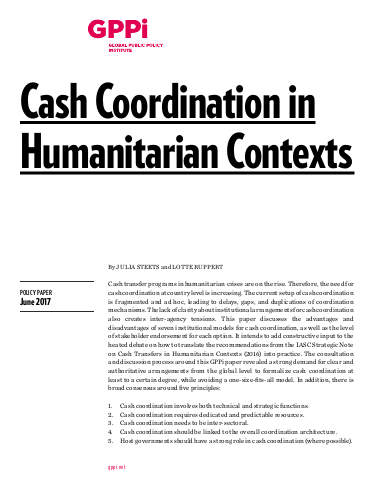
As more agencies are using cash transfer programs in humanitarian contexts, the need for coordination has grown. Currently, the cash working groups established by aid organizations in emergency settings vary in their leadership and institutional setups. This ad hoc approach has helped fill important gaps, but it has major shortcomings such as delays, gaps and duplications of coordination mechanisms. The lack of clarity about institutional arrangements for cash coordination also creates inter-agency tensions. The need to formalize cash coordination is broadly recognized, but discussions on how this should be implemented are stymied by controversy. While the Inter-Agency Standing Committee (IASC) endorsed the Strategic Note on Cash Transfers in Humanitarian Contexts (2016), some of the main actors involved still disagree on how to take the recommendations from the note forward.
To add constructive input to this heated debate around cash coordination, the Cash Learning Partnership (CaLP) commissioned the Global Public Policy Institute (GPPi) to prepare this policy paper. This paper highlights the shortcomings of the current approach, discusses which crucial coordination functions need to be performed, and weighs the strengths of seven potential coordination models. It also indicates the level of stakeholder endorsement for each option and the probability of achieving this setup given the current architecture and political sensitivities. The aim of the paper is not to advocate for a single model. Instead, it intends to build on the IASC Strategic Note’s “initial ideas” on the possible positioning of cash coordination fora, while ensuring that all relevant stakeholders are involved in analyzing and developing potential solutions.